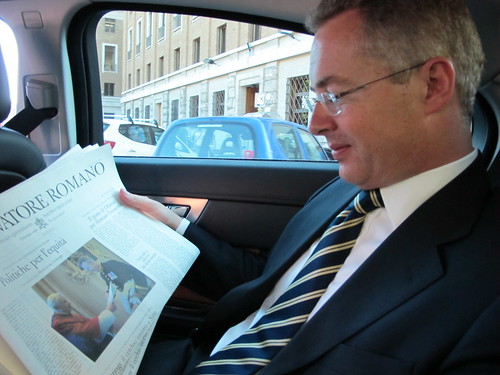
It is incumbent upon British ambassadors to understand the country that they serve. Which is why I spent much of last week in Northern Ireland, following similar “pastoral” tours in England and Scotland (Wales is still to do). I also took the opportunity to visit Dublin, given the fact that both the Roman Catholic and Church of Ireland (Anglican) Archbishops of Armagh, Cardinal Brady and Archbishop Harper, are Primates of All-Ireland of their respective churches, and events in the Republic clearly impact further north.
I was struck by the importance of religion across the island of Ireland. Faith has formed the historical, social, cultural, political and even economic identity of the island to an extent evidently visible even in our secular 21st century. Armagh is the microcosm. The two Cathedrals, both dedicated to St Patrick, salute each other from their respective hilltops across the narrow valley, standing near ground that was once significant as a pre-Christian spiritual centre, the Navan of the old tales. And in Dublin, I took a brief opportunity between meetings to admire the Book of Kells in Trinity College Library, one of the great early medieval Christian texts, housed in a university once known as a bastion of Anglicanism in a Catholic country, now open to students of all faiths and none.
I learned by talking to them that politicians of all stripes in Northern Ireland are comfortable talking about their faith and its role in their daily lives, to an extent perhaps not seen elsewhere in the United Kingdom. And there was a clear message that, whilst differences between the faiths may have been a significant element in the wars and troubles that have beset Ireland, in the 21st century religion should be seen more as a uniting than a dividing force. At one dinner with Presbyterian and Catholic thinkers, I learned about the extraordinary efforts at reconciliation that have been spearheaded by community leaders driven by their beliefs. And at a lunch in Belfast for the heads of all the principal Churches in Northern Ireland, discussion was dominated not by religious differences but by their common ground on the economic and political challenges facing the region: education, the difficult economic situation, unemployment and its social impact.
Northern Ireland is present here in Rome, from seminarians in the Pontifical Irish College, to its representatives in the Curia, to the many visitors of all faiths that visit the city. My predecessor, a native of County Down, enjoyed a head start on me in understanding the Province. But I was pleased to learn at Stormont that British ambassadors posted across the world are regular visitors. Foreign policy, after all, must begin at home.
